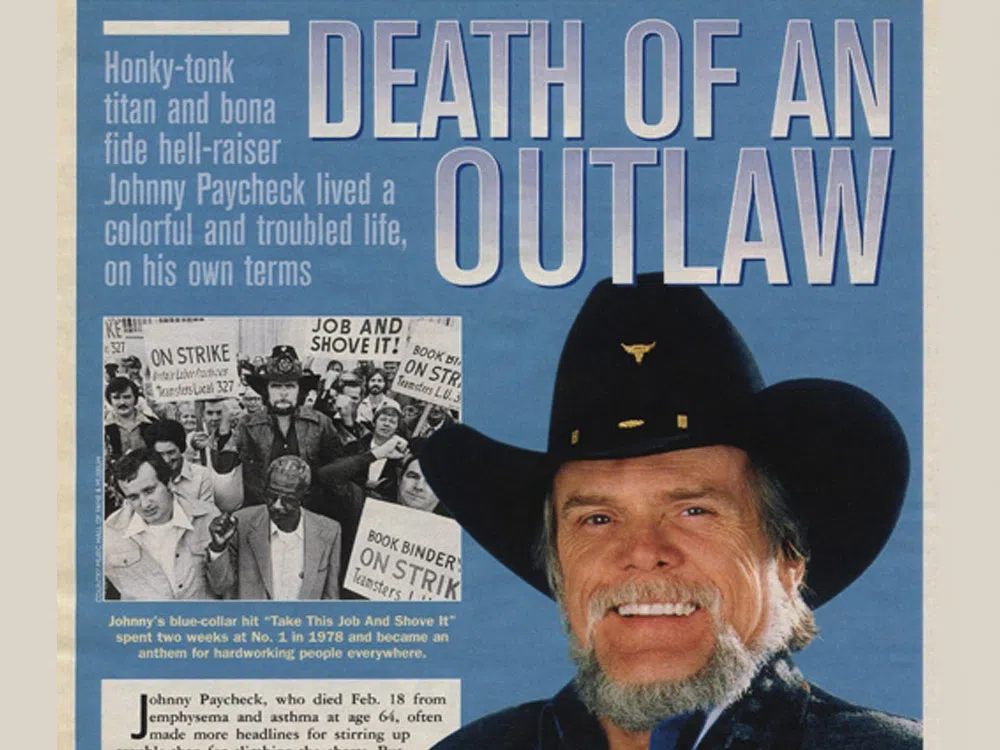Originally published in the April 1, 2003 issue of Country Weekly magazine featuring Vince Gill and his wife Amy Grant on the cover.
Johnny Paycheck, who died Feb. 19, 2003 from emphysema and asthma at age 64, often made more headlines for stirring up trouble than climbing the charts. But the singer who scored more than 40 hits was one of country’s truly original stylists — as well as a bona fide hell-raising “outlaw” who served two prison terms and fought a running battle with alcohol and drug problems.
 Born Donald Eugene Lytle May 31, 1938 in Greenfield, Ohio, Johnny began his career playing bass and singing harmony vocals for such acts as Porter Wagoner and George Jones. He also wrote Tammy Wynette’s debut hit, “Apartment #9.”
Born Donald Eugene Lytle May 31, 1938 in Greenfield, Ohio, Johnny began his career playing bass and singing harmony vocals for such acts as Porter Wagoner and George Jones. He also wrote Tammy Wynette’s debut hit, “Apartment #9.”
After adopting the stage name “Johnny Paycheck” in 1962, he recorded for tiny Hilltop Records, debuting on the charts in 1965 with “A-11.”
Johnny broke finally through six years later with the Top 5 smash “She’s All I Got.” In 1972, “Someone To Give My Love To” also reached the Top 5, establishing him as a master of soulful, raw-edged country ballads. He could write touching personal songs as well, like his 1986 hit “Old Violin,” in which he compared himself to a used-up musical instrument, soon to be put away and never played again.
But his 1977 blue-collar anthem “Take This Job And Shove It” – his only No. 1 – put Johnny on the map as a national hero to the working classes.
The song inspired a movie of the same name and an album that sold a million copies. “Take This Job And Shove It” continues to have a life of its own even today – many factories and construction sites blare the song at the end of the work week, and radio stations still play it during drive-time on Friday afternoons.
But Johnny was also a rough-and-tumble character who continually ended up paying for his wild ways. In 1956, while in the Navy, he was court-martialed for assaulting an officer and spent two years in military prison. In 1982 he was fined $175,000 in a slander suit by an airline flight attendant, and he pleaded no contest in 1983 to a sexual assault charge involving a 12–year-old girl in Wyoming. (Johnny later insisted that he was innocent and that he entered his plea on the advice of his attorney.)
Then in 1989, he served prison time again after shooting a man during a barroom argument in Ohio. The victim, Larry Wise, survived – with Johnny later insisting that Wise, little worse for the wear, returned to the bar later that evening with a simple Band-Aid over the wound.
“Johnny Paycheck was country music,” noted Trace Adkins. “He didn’t just sing it or perform it — he lived it.”
After his prison release from the Ohio shooting sentence in 1991, Johnny vowed to walk a straighter path. He cleaned up his high-octane lifestyle and became a born-again Christian.
 But in recent years, Johnny’s life became overwhelmed with legal and health troubles. In 1990 he landed in bankruptcy, listing debts of more than $1.6 million, most of it owed to the IRS. One of the few bright spots came in 1997 when he was welcomed as a member of the Grand Ole Opry.
But in recent years, Johnny’s life became overwhelmed with legal and health troubles. In 1990 he landed in bankruptcy, listing debts of more than $1.6 million, most of it owed to the IRS. One of the few bright spots came in 1997 when he was welcomed as a member of the Grand Ole Opry.
Tracy Byrd was especially saddened by Johnny’s death. Tracy enjoyed hits with remakes of Johnny’s “Someone To Give My Love To” and “She’s All I Got.” “I’ve been a Paycheck fan since I was a little kid,” says Tracy. “I have a lot of good memories of Johnny. A few years back, Mark Chesnutt and I went to a show Johnny was playing. We got up and did 15 songs with him.”
Other stars also tipped their hats to Johnny. Tammy Cochran hailed Johnny as “one of the artists who made country music what it is today. He and other artists of the genre are the roots.”
Daryle Singletary had the opportunity to record with Johnny when the aging outlaw provided a recitation to Daryle’s cover version of “Old Violin,” in 2002. “He became family, because he went above and beyond to do that for me,” says Daryle. “I was very honored and still am.”
Sadly, Johnny spent the last year of his life bedridden in a nursing home. He left behind his wife of 30 years, Sharon, and one son.
Last year, a new CD, The Soul & The Edge: The Best Of Johnny Paycheck, was released as a tribute to Johnny, offering a great insight into his vocal and writing talents. Included on the album are the defiant “I’m The Only Hell (Mama Ever Raised),” “Ragged Old Truck” and “Take This Job And Shove It.”
Those songs define an image for which Johnny never apologized. “To me, an ‘outlaw’ is a man that did things his own way, whether you liked him or not,” he once commented.
“I did things my way.”
Learn more about Johnny at his official website, http://www.johnnypaycheckmusic.com.









